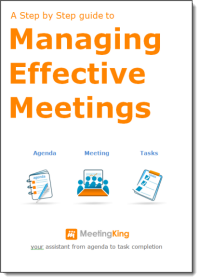 Many people think meetings are a waste of time but that is probably because they are making the 10 biggest mistakes while attending a meeting. Meetings can be highly productive as long as the time is used effectively.
Many people think meetings are a waste of time but that is probably because they are making the 10 biggest mistakes while attending a meeting. Meetings can be highly productive as long as the time is used effectively.
Share this list with your team and you will have more effective meetings.
1. Not having a goal
The number one mistake that meeting goers make is not having a goal of what they want to get from the meeting. Without a goal the meeting really does become purposeless. Avoid this by reviewing the meeting beforehand and understanding what you hope to achieve by going – such as sharing an update or finding out information about a project.
2. Insisting on going ahead without key people
There is really no point having the meeting if the people needed to provide either updates or direction are not there. The meeting will end up being aimless in that case. Don’t insist on pushing ahead. Instead reschedule for a time that the person or people can make it.
3. Not reviewed the agenda
If you do not review the agenda before the meeting then you will not have a clear idea of what the meeting will be about. You will also not have prepared yourself for it effectively so there is a risk that you will be wasting other people’s time at the meeting. Make sure you look at the agenda beforehand and prepare appropriately. If you’re not already using it you could consider MeetingKing for the setting of good meeting agendas.
4. Not being prepared technically
if you have to give a presentation at the meeting, make sure that the technology is in place and working in advance. There is little that is more frustrating for other meeting attendees as you fuss around trying to get the projector to work. Arrive at the meeting 10 minutes early and get the technical side set up before others arrive. If you attend a virtual meeting make sure you log in a few minutes early, so the meeting can start on time.
5. Not checking that someone is taking minutes
Normally at a meeting you can expect that someone will be taking minutes and sending actions around afterwards. Find out who that person is at the start. Otherwise if no-one is taking minutes you’ll find yourself having the same meeting over again in a couple of weeks when no-one can remember what was discussed. MeetingKing has great functionality for minute taking and minutes can be easily circulated and the meeting tasks can be followed up on afterwards.
6. Showing up late
If you show up late the meeting may not start on time. That means you’ll be wasting the time of the other participants. Alternatively the meeting may start without you and you may miss key points that you needed to know about. Turning up on time is the polite thing to do which easily gets past this problem.
7. Bringing an extra person or two with you
When participants start bringing extra meeting attendees with them the meeting starts to get unwieldy. The old saying “Too many cooks spoil the broth” comes into play. Unless there is a genuinely good reason for bringing the extra person, such as they are taking over from you on the project, then leave them behind.
8. Dialing in from a noisy place
On a conference call there’s always one that dials in from somewhere really noisy. That makes it really hard for the rest of the attendees to be able to listen properly and concentrate. The simple solution here is – don’t do it. Make sure you are prepared for your meetings properly by being somewhere quiet.
9. Going off topic
It’s all so easy to get carried away once you get started, and go off onto a rant about something that is important to you but not really relevant to the meeting. Don’t do this – it’s annoying for others and it wastes their time. It will also encourage others to do the same, meaning that your time will get wasted too. Stick to the main points of the meeting, and before you open your mouth, ask yourself, “Is this really relevant?”
10. Not raising the important questions
If you don’t ask the pressing questions that concern you, maybe no one will. That’s a problem that could end up leading to the failure of a project. Or, maybe you don’t understand what someone is saying and you need it clarifying. Chances are other people in the room feel the same way. Make sure that you ask for the clarity that you need so that you understand how issues affect you and so that you can do your job effectively.
MeetingKing has a useful checklist for the holding of productive meetings. Following this will help you to avoid making some of these key meeting mistakes.


